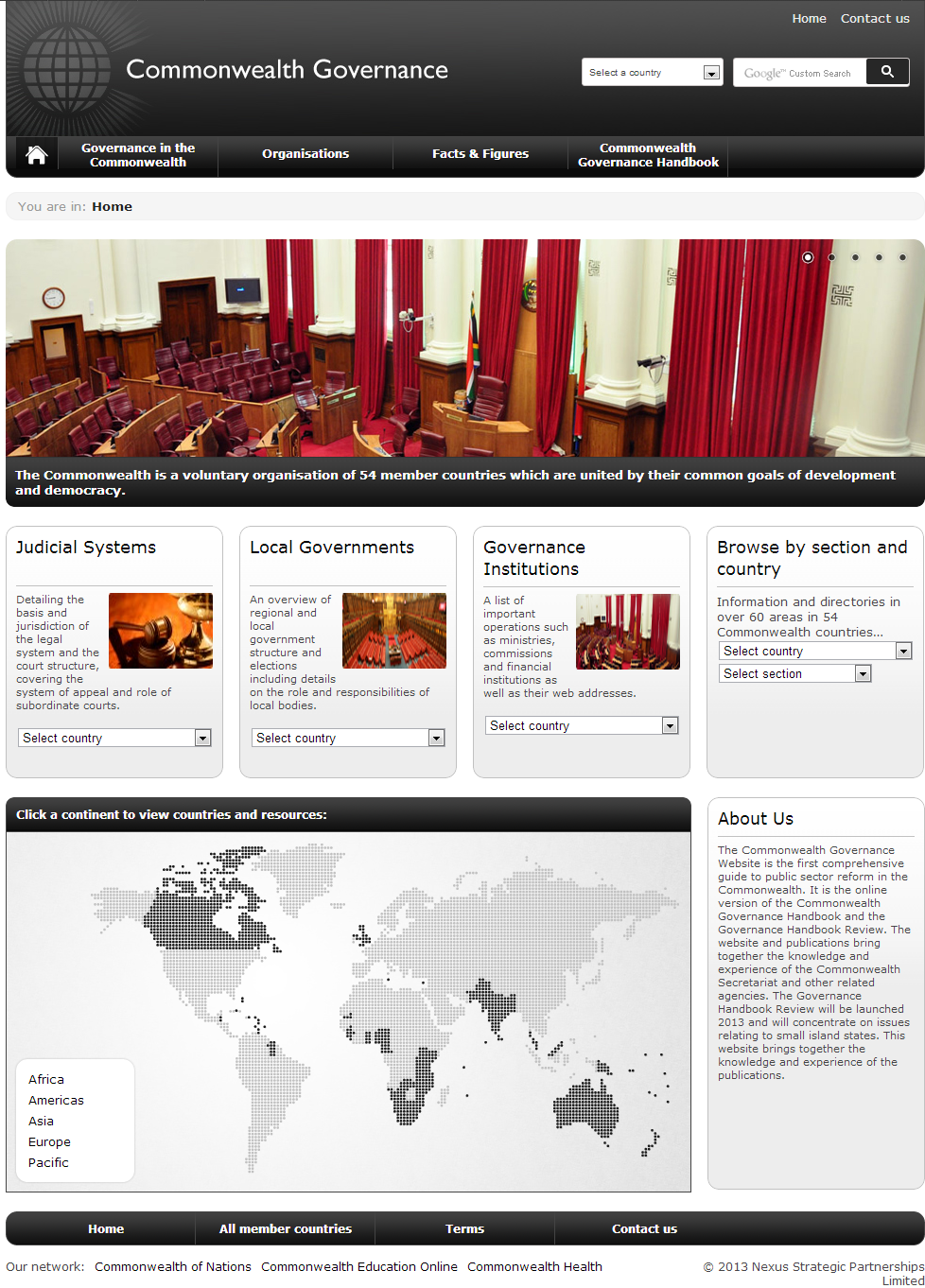The Commonwealth Secretariat serves the institutional and capacity development needs of governments in member countries. Its aim is to strengthen governance as a prerequisite to poverty alleviation and sustainable development. Public sector development (PSD) promotes synergies between governance and development.

 |
| The Commonwealth Governance Website is the first comprehensive guide to public sector reform in the Commonwealth and the online version of the Commonwealth Good Governance publication. |
The promotion of good governance and accountable administration has been a priority activity for the Commonwealth Secretariat since the Harare Commonwealth Declaration of 1991, in recognition that efficient public service is a necessary underpinning of just and honest government.
Many Commonwealth countries face challenges in their public sectors including limited resources, a lack of trained officials in key areas, corruption, a weak policy environment and a lack of knowledge and technology. Weak public service institutions and resource constraints severely limit their capacity to sustain development, reduce poverty and achieve the UN’s Millennium Development Goals.
The global economic and financial crisis has highlighted the pressures on many governments in the Commonwealth and has left them with tight fiscal constraints within which to operate.
Governments are left with fewer real choices, which makes the need for efficiency and value for money all the more imperative. Secretariat governance work focuses on helping member countries to reduce management and systemic inefficiencies that undermine productivity and overall service delivery.
The Secretariat’s Public Sector Development Programme helps Commonwealth developing countries to strengthen their structures of governance and public administration. It focuses on advancing good governance, improving public service delivery, promoting the use of information and communication technology (ICT), and developing leadership and human resource management capacities. This work is interlinked and mutually reinforcing, with all aspects considered vital to promoting good governance.
Meeting needs
The programme responds to a range of issues to meet the specific needs of member countries. It also responds to CHOGM (Commonwealth Heads of Government Meeting) and ministerial mandates related to combating corruption, ICTs for development, public-private partnerships, corporate governance, stronger local government and effective public financial management. In addition, policy advocacy of other thematic priorities affecting Commonwealth governments is an essential element of support for public sector organisations.
Each programme activity is tailored to the needs of the country, the region, or the Commonwealth as a whole. Each year, some 70 public sector development assignments are implemented in Commonwealth countries. Around 150 consultants and field experts are active each year. Many of them advise central government departments; others work in hospitals, or in legal, trade, infrastructural or training institutions. Some are technical advisers; others operational experts, working with and training government officials.
An example is the Commonwealth Connects Programme, which is helping to bridge the deepening digital divide across the 53 countries of the Commonwealth. This programme works to enable the effective use of ICT strategies, e-governance and knowledge management.
Over the years, the Secretariat has developed excellent working relations with member governments based on trust. They value counsel that is independent and discreet in sensitive matters. This facilitates the provision of high-level strategic advice, such as through the joint workshops that are offered for cabinet ministers and permanent secretaries following government transitions. Belize, Grenada, Lesotho, Mozambique, St Lucia, Solomon Islands and Swaziland are some of the countries that have strengthened the political-administrative interface with the helping hand of Commonwealth advisers, some of whom have been former prime ministers.
Commonwealth countries share similar governance systems, largely due to their common heritage. Each has comparative advantages that can be shared with others, making South-South advice particularly relevant. The Secrtariat facilitates relationships involving developing countries and their public institutions. It encourages the exchange of experiences to enable sustainable reforms and robust public sectors.
The Secretariat has a unique mix of public sector expertise at a single point of access that draws on both in-house advisers and a broad range of specialists from member countries and their institutions. It is therefore an expert in government systems and in identifying the needs and priorities of member countries, as well as in related regional and pan-Commonwealth issues.
The Secretariat also responds to needs in niche areas where donors may not be flexible enough. As a facilitator of mutual development assistance, it offers value for money without the conditionality of traditional donors.
With 31 Commonwealth countries being small states, the Secretariat must act quickly on requests for assistance with minimal administrative hurdles, low transaction costs and small-scale projects. An example of this is the newly established Commonwealth Pacific Governance Facility which recognises the specific governance requirements of small island states in the Pacific region. It focuses on democratic institutions, anti-corruption bodies, access to information and land management issues.


